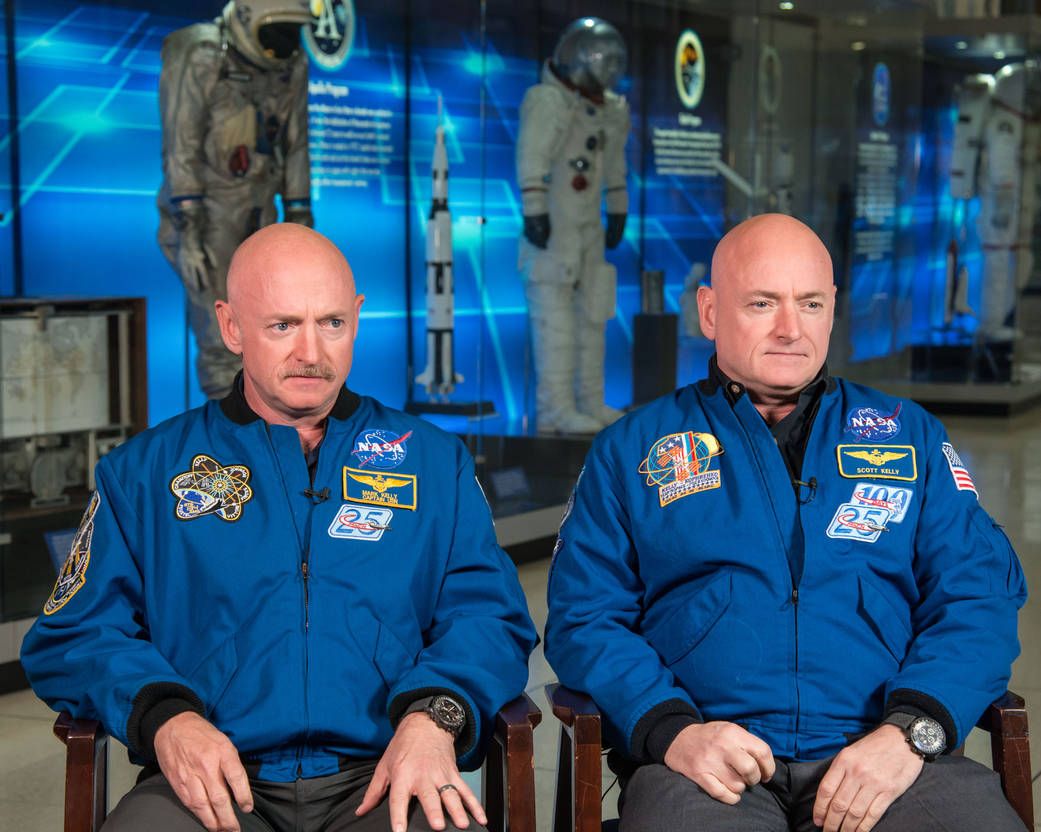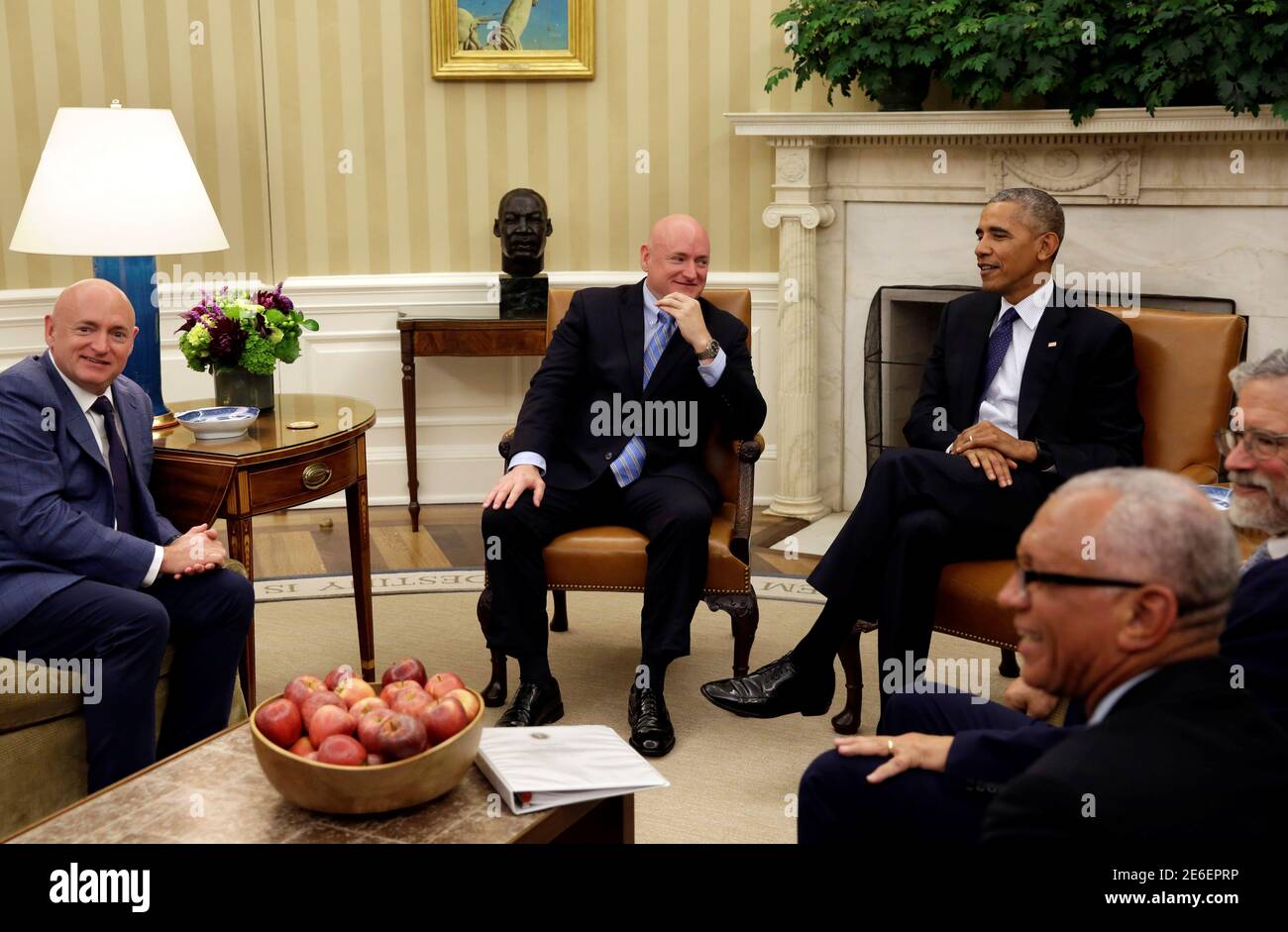Scott Kelly And Mark Kelly: The Twin Astronauts Who Pushed The Boundaries Of Science
When you think about groundbreaking scientific research, the names Scott Kelly and Mark Kelly might just pop into your mind. These twin astronauts have been making waves in the world of space exploration for years. Not only are they identical twins, but they’ve also played a pivotal role in NASA’s groundbreaking research on the effects of space travel on the human body. It’s like a real-life sci-fi movie, except this one is 100% legit.
Imagine this: two brothers, both highly skilled, both astronauts, but only one spends a year in space while the other stays on Earth. That’s exactly what happened with Scott and Mark Kelly. This experiment wasn’t just about sending someone to space; it was about understanding how the human body adapts to microgravity and what that means for future long-term missions, like the ones to Mars.
So, why should you care? Well, if you’ve ever wondered how space travel affects our bodies, or if you’re just fascinated by the lives of these two incredible astronauts, you’re in for a treat. Let’s dive into the world of Scott and Mark Kelly, where science meets adventure.
Biography of Scott Kelly and Mark Kelly
Early Life and Career
Before they became astronauts, Scott Kelly and Mark Kelly were just two kids from West Orange, New Jersey. Born on February 21, 1964, these twins had a knack for adventure from a young age. Growing up, they weren’t exactly model students. In fact, Scott struggled with reading and writing so much that he almost gave up on school altogether. But then something changed. A book about astronauts inspired Scott to pursue a career in aviation, and the rest, as they say, is history.
Both Scott and Mark followed similar career paths, joining the Navy and becoming test pilots. Their skills and dedication eventually caught the attention of NASA, leading to their selection as astronauts in 1996. Talk about sibling rivalry, right? Except in this case, it’s more like sibling collaboration.
| Name | Scott Kelly | Mark Kelly |
|---|---|---|
| Birth Date | February 21, 1964 | February 21, 1964 |
| Birth Place | West Orange, New Jersey | West Orange, New Jersey |
| Education | Bachelor’s in Ocean Engineering, University of New Hampshire | Bachelor’s in Marine Engineering, University of Arizona |
| Career | Astronaut, NASA | Astronaut, NASA |
The NASA Twins Study: A Groundbreaking Experiment
Why the Twins Study Matters
Now, let’s talk about the main event: the NASA Twins Study. This study wasn’t just any ordinary experiment; it was a once-in-a-lifetime opportunity to study the effects of space travel on the human body using identical twins as subjects. Scott spent 340 days aboard the International Space Station (ISS), while Mark stayed on Earth, providing a perfect control subject.
The goal was simple yet ambitious: to understand how the human body adapts to the harsh environment of space. Researchers looked at everything from genetic changes to cognitive function, and the results were mind-blowing. For instance, Scott’s telomeres—those little caps on the ends of our chromosomes—actually grew longer in space, something that doesn’t usually happen as we age. Crazy, right?
But that’s not all. The study also revealed changes in Scott’s gut microbiome, DNA methylation, and even his immune system. These findings are crucial for planning future missions to Mars and beyond, where astronauts will spend years away from Earth.
Key Findings from the Twins Study
Genetic Changes in Space
One of the most fascinating aspects of the Twins Study was the genetic changes observed in Scott. Researchers found that spending a year in space caused significant alterations in his gene expression. Some of these changes reversed once Scott returned to Earth, but others persisted, suggesting that space travel can have long-lasting effects on our DNA.
- Scott’s telomeres grew longer in space, potentially due to increased exercise and reduced caloric intake.
- Gene expression related to immune function, DNA repair, and bone formation showed significant changes.
- Some of these changes reverted after Scott returned to Earth, but others remained, highlighting the complexity of space adaptation.
These findings have profound implications for future space missions, especially those involving long-duration stays in space. Understanding how our genes respond to microgravity is key to ensuring astronaut health and safety.
The Impact on Future Space Missions
Preparing for Mars and Beyond
So, what does all this mean for the future of space exploration? Well, the Twins Study provides valuable insights into the challenges of long-term space travel. For one, it highlights the need for better health monitoring and intervention strategies to protect astronauts during extended missions.
Imagine sending humans to Mars, a journey that could take anywhere from six months to a year, depending on the alignment of the planets. During that time, astronauts will face numerous challenges, from radiation exposure to psychological stress. The data from the Twins Study can help scientists develop countermeasures to mitigate these risks, ensuring that future explorers return home safe and sound.
Personal Lives and Achievements
Beyond the Space Suit
While Scott and Mark are best known for their work with NASA, they’ve also achieved a lot outside of space exploration. Mark, for instance, is a former Navy pilot and a retired astronaut who has flown on four space shuttle missions. He’s also an author, sharing his experiences and insights through books like “Antarctica: A Year in the Life of Earth’s Southernmost Continent.”
Scott, on the other hand, is a bestselling author and public speaker. His memoir, “Endurance: A Year in Space, A Lifetime of Discovery,” provides a fascinating look at his life as an astronaut and the challenges he faced during his year-long mission aboard the ISS. Both brothers have also been vocal advocates for space exploration and STEM education, inspiring the next generation of scientists and engineers.
Challenges Faced by the Kelly Brothers
Life in Space vs. Life on Earth
Being an astronaut isn’t all glamour and glory. Both Scott and Mark faced numerous challenges throughout their careers, from grueling training sessions to the psychological toll of long-duration space missions. Scott, in particular, had to deal with the isolation and confinement of living aboard the ISS for an entire year.
But it’s not just about the physical and mental challenges. The Kelly brothers also had to navigate the complexities of public life, especially after Scott’s year in space made headlines around the world. Mark, for instance, gained national attention when his wife, former congresswoman Gabrielle Giffords, survived an assassination attempt in 2011. Through it all, the brothers have remained grounded, focusing on their work and their families.
Lessons Learned from the Kelly Brothers
What We Can Learn from Their Journey
The story of Scott and Mark Kelly is more than just a tale of scientific discovery. It’s a lesson in perseverance, teamwork, and the pursuit of knowledge. Both brothers have shown us that with dedication and hard work, we can achieve incredible things, even in the face of seemingly insurmountable challenges.
For aspiring astronauts and scientists, the Kelly brothers serve as role models, demonstrating the importance of curiosity and a willingness to take risks. They’ve also shown us the value of collaboration, not just between individuals but between nations, as space exploration becomes an increasingly global endeavor.
Future Prospects and Research
What’s Next for Space Exploration?
With the success of the Twins Study and other groundbreaking research, the future of space exploration looks brighter than ever. NASA and other space agencies around the world are planning ambitious missions to the Moon, Mars, and beyond, with the goal of expanding our understanding of the universe and our place within it.
Scott and Mark Kelly may have retired from active duty, but their contributions to science and space exploration will continue to inspire future generations. As we look to the stars, their legacy serves as a reminder of what we can achieve when we push the boundaries of human knowledge and capability.
Conclusion: The Kelly Legacy
In conclusion, Scott Kelly and Mark Kelly have left an indelible mark on the world of space exploration. Through their work with NASA and the groundbreaking Twins Study, they’ve helped us understand the challenges and opportunities of long-term space travel. Their story is one of courage, determination, and the relentless pursuit of knowledge.
So, the next time you look up at the night sky, remember the Kelly brothers and the incredible work they’ve done to push the boundaries of human exploration. And if you’re inspired by their journey, why not share this article with a friend or leave a comment below? Who knows? You might just inspire the next great astronaut or scientist!
Table of Contents
- Biography of Scott Kelly and Mark Kelly
- The NASA Twins Study: A Groundbreaking Experiment
- Key Findings from the Twins Study
- The Impact on Future Space Missions
- Personal Lives and Achievements
- Challenges Faced by the Kelly Brothers
- Lessons Learned from Their Journey
- Future Prospects and Research
- Conclusion: The Kelly Legacy
Why Rangers Hockey Is The Heartbeat Of New York Sports
Trump Releases Over 2,000 New JFK Assassination Files: What We Know
Where To Watch Milwaukee Bucks Vs Golden State Warriors: The Ultimate Fan Guide

Astronaut Scott Kelly and his brother Mark Kelly Memes Imgflip

About Mark Mark Kelly for Senate

Scott kelly mark kelly hires stock photography and images Alamy